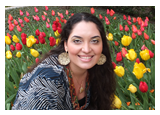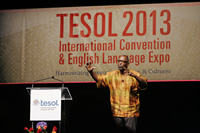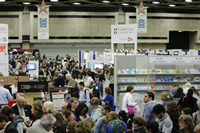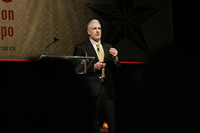|
 Despite having heard of the greatness of TESOL International’s conventions, I had not yet been able to attend one until this year’s convention, entitled "Harmonizing Language, Heritage, and Cultures," held in Dallas, Texas, USA. The title itself caught my attention because one of my research areas has been heritage language education, more specifically, immigrant children’s assimilation to the target culture and their dissimilation to the cultural and linguistic heritage brought to them through previous generations. Drawn by this personal interest in the integration of language and culture, it was with great excitement and expectation that I registered for TESOL 2013 International Convention and English Language Expo. Despite having heard of the greatness of TESOL International’s conventions, I had not yet been able to attend one until this year’s convention, entitled "Harmonizing Language, Heritage, and Cultures," held in Dallas, Texas, USA. The title itself caught my attention because one of my research areas has been heritage language education, more specifically, immigrant children’s assimilation to the target culture and their dissimilation to the cultural and linguistic heritage brought to them through previous generations. Drawn by this personal interest in the integration of language and culture, it was with great excitement and expectation that I registered for TESOL 2013 International Convention and English Language Expo.
From the time of registration to the end of the convention, I was constantly surprised by the large-scale venue, multiple concurrent sessions and amazing attendee-turnout. It is indeed overwhelming as a first-timer, but greatly encouraging to meet and interact with educators and scholars from all over the world who share the common goal of making a difference in any language-learning environment. Attendees certainly have a passion for the teaching profession, and they believe that language learning is a powerful tool in today’s multicultural and multilingual society.
 In the opening general session, “Solving for X: Critical Thinking and Problem-Solving Essentials,” keynote speaker John Hunter presented on his brilliant idea of the Peace Game, demonstrating how effective learning can be when teachers inspire students to take ownership of their learning experience. By encouraging students to think critically and by guiding them through the process of cooperative learning, Mr. Hunter has experienced outstanding results. Despite Mr. Hunter’s students being at the elementary school level, convention attendees were certainly inspired by his talk, regardless of the age group they taught. In addition to being entertained by Mr. Hunter’s story-telling gift, the audience was moved by the impact of the authentic, autonomous, and interactive learning environment he has successfully created. In the opening general session, “Solving for X: Critical Thinking and Problem-Solving Essentials,” keynote speaker John Hunter presented on his brilliant idea of the Peace Game, demonstrating how effective learning can be when teachers inspire students to take ownership of their learning experience. By encouraging students to think critically and by guiding them through the process of cooperative learning, Mr. Hunter has experienced outstanding results. Despite Mr. Hunter’s students being at the elementary school level, convention attendees were certainly inspired by his talk, regardless of the age group they taught. In addition to being entertained by Mr. Hunter’s story-telling gift, the audience was moved by the impact of the authentic, autonomous, and interactive learning environment he has successfully created.
 In between sessions, the Expo Hall was the perfect place to visit. Its well-designed setting drew my attention to the vast array of exposed resources. Though I was not particularly in search of a textbook, I could still enjoy skimming through various materials, especially resources for professional development. Attendees in search of teaching materials undoubtedly left with a better understanding of what is available in the market today, what best reflects their teaching goals, and what most powerfully answers to their students’ needs. In between sessions, the Expo Hall was the perfect place to visit. Its well-designed setting drew my attention to the vast array of exposed resources. Though I was not particularly in search of a textbook, I could still enjoy skimming through various materials, especially resources for professional development. Attendees in search of teaching materials undoubtedly left with a better understanding of what is available in the market today, what best reflects their teaching goals, and what most powerfully answers to their students’ needs.
 A general session keynote that I found particularly interesting was Dr. Aram deKoven’s talk entitled “Subconsciously Held Bias: Exposing the Myth of Racial Colorblindness.” Teaching a graduate-level intercultural communication course, and being consciously aware of the dangers of false representation, stereotyping and othering, I was intrigued by the title of this session and curiously joined in. Dr. deKoven’s examples of research depicting the subconsciously embedded biases that humans have of people and places around them were eye opening. It is alarming to think that language teachers, while claiming to be colorblind, might actually be carrying racist preconceptions and unnoticed behavior into their classrooms and into their encounters with students. The content of this session has reminded me of the importance of constant self-reflection and self-evaluation as a language instructor in a global society. A general session keynote that I found particularly interesting was Dr. Aram deKoven’s talk entitled “Subconsciously Held Bias: Exposing the Myth of Racial Colorblindness.” Teaching a graduate-level intercultural communication course, and being consciously aware of the dangers of false representation, stereotyping and othering, I was intrigued by the title of this session and curiously joined in. Dr. deKoven’s examples of research depicting the subconsciously embedded biases that humans have of people and places around them were eye opening. It is alarming to think that language teachers, while claiming to be colorblind, might actually be carrying racist preconceptions and unnoticed behavior into their classrooms and into their encounters with students. The content of this session has reminded me of the importance of constant self-reflection and self-evaluation as a language instructor in a global society.
After joining a handful of sessions at the convention, I could not help but notice that the talks attracting the greatest crowds were those introducing practical language-teaching ideas. With a heavy workload and the responsibility of teaching courses that greatly vary in content, many educators find themselves in need of fresh ideas that can immediately be implemented into their courses, with prospects of motivating students and helping them to better develop their language skills. Even teachers who are required to follow a particular textbook find themselves in search of flexible activities to be shaped into their somewhat structured courses.
In conclusion, attending the 2013 international convention has been an edifying and fruitful experience. Being part of such a huge production has given me even more enthusiasm and passion for my teaching career. It has challenged me to question my performance as an educator, reevaluate my commitment to my students, and reestablish my professional goals. As I start a new school year this spring, I will be reflecting on the wisdom that has been shared with me at the TESOL 2013 International Convention and English Language Expo. As a final remark, I would like to extend my deepest appreciation to all of those whose effort and dedication made this even possible. It is with great expectation that I await next year’s production.
__________________________
Vivian Bussinguer-Khavari is an associate professor at Kwansei Gakuin Univeristy, in the prefecture of Hyogo, Japan. She has a masters and a doctorate in applied linguistics and her major areas of interest are intercultural communication, heritage language education, and second language acquisition.
|